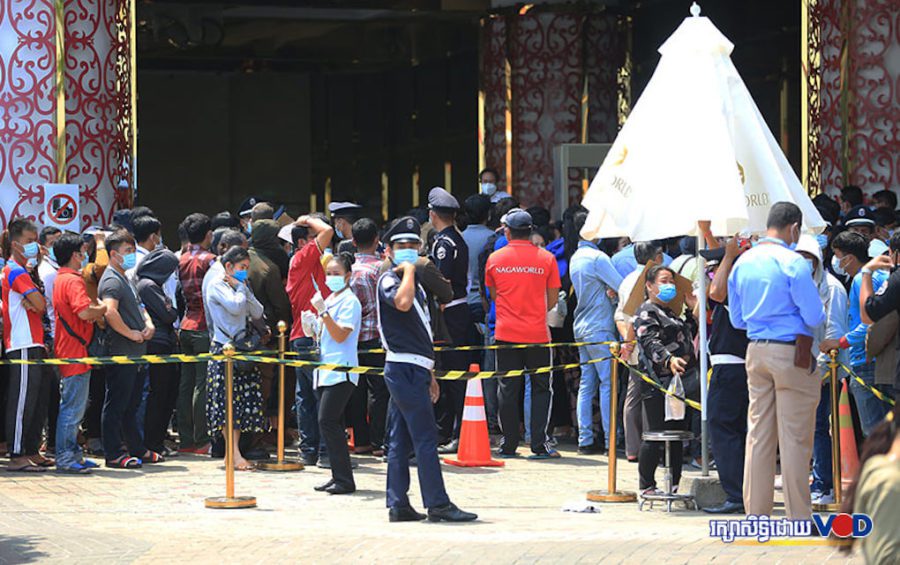NagaCorp, the Hong Kong-listed parent company of Phnom Penh’s exclusive-operating casino NagaWorld, reported losses for the first time since the company was publicly listed, amid the pandemic and an ongoing labor dispute with more than 300 laid-off employees.
In its six-month financial report, NagaCorp reported $77.2 million in losses in the first half of the year, which it attributed to the nearly four months of closure since the casino temporarily shuttered on March 2 following a Covid-19 outbreak at Naga 2.
According to reports from its 16 years of being listed on the Hong Kong exchange, NagaCorp’s net profit steadily increased between 2014 and 2019 — when profits peaked at $521.3 million — and the company had never reported net losses since 2004, the earliest data available.
The company earned $130 million in revenue, 85 percent of which came from gaming tables, according to the report. The full casino operation revenue for the first half of this year, reported at $129 million, was down 65 percent from casino revenue in the same period last year.
In its analysis of expenses, the company noted earnings were recovering in the first two months of the year until the closure. Since then, NagaWorld had reduced its expenses while casino and hotel operations paused for nearly four months, it said.
Among its cost-cutting measures, the company reduced its staff costs by almost 40 percent, to $39.8 million, noting that its employees were reduced from 8,371 in June 2020 to 6,958 as of the report. The company said it offered a “mutual separation option” to employees in line with Cambodian law.
The NagaWorld workers union, however, has accused the company of undercutting workers through its layoff payment calculations and of unilaterally transferring compensation to workers who rejected the termination and were still contesting the company’s decision through the Labor Ministry’s dispute resolution process.
The union has further said the company had fired union organizers without getting authorization from labor inspectors, as required by the Trade Union Law.
The Star Vegas casino in Poipet — under another international casino company, the Australian-listed Donaco International — also reported losses after tax of AU$6.9 million, or just over US$5 million, for its annual report for the year ending June 30. Average daily visits to the casino were down 93 percent, and the casino was mandated to close as of April, which led to VIP turnover declining by 84.7 percent, according to the company’s report.
When asked if the Finance Ministry was considering allowing casinos to reopen, Ros Phirun, the ministry’s spokesperson overseeing commercial gambling, said there were no plans right now because Covid-19 transmission had created a lot of uncertainty. But there was push from the industry, he said.
“It’s not only NagaWorld, but other casinos want to reopen,” he said. “We’re still considering it. … Hopefully operations should resume by next year.”
There was no pandemic-era financial support for the industry, he said, adding that the ministry was taking the closure period to discuss how regulations under the country’s new Casino Law, signed at the end of last year, would be enacted.
NagaCorp noted in its report that it is proceeding with construction of the Naga 3 extension behind the company’s complex in Chamkarmon district — the site of the former “White Building” affordable housing project — as well as a casino and resort in Vladivostock, Russia.
As of its last annual report, NagaCorp founder and CEO Chen Lip Keong controlled some 94 percent of the listed company. For the first half of the year, the company reported $0.0178 in losses per share.
Chen is also a frequent lender to his company, according to the report. Chen’s wholly-owned ChenLipKeong Capital Fund subscribed to $45 million in notes, or a debt security with a defined repayment date of 2024, issued to help the company fund developments. For these notes, NagaCorp paid $1.789 million in interest payments in the first half of the year to the CEO’s company. Additionally, the report notes that it paid $165.5 million to ChenLipKeong Fund Limited, a Cayman Islands-registered entity fully owned by Chen, which is funding half of the $3.5 billion Naga 3 project under a 2019 agreement.













